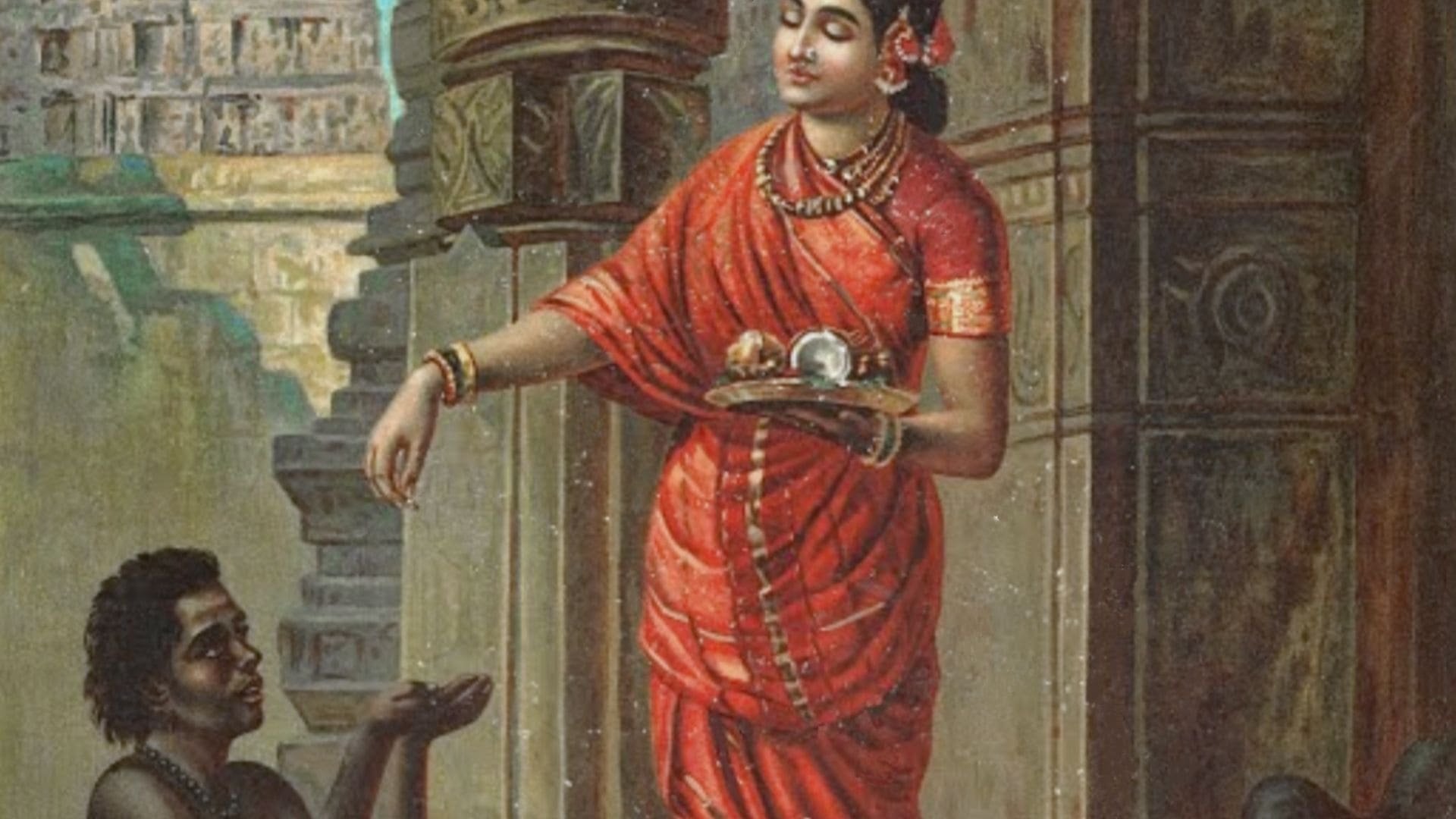
Mandodari: The Graceful and Resilient Queen of the Ramayana
- Mandodari was the second most beautiful women in entire Ramayana. First being Sita which is accepted by Mandodari herself. When Lord Hanuman saw a beautiful women lying on the bed next to Ravana, he thought that the beautiful women could be Sita. But later realized she cannot be Sita since she was lying next to some other man and was decorated.
The ape saw Mandodari, beautiful in form, lying down on that bed. The mighty-armed son of the wind god saw that ornamented one and reasoned that this one, full of the wealth of beauty and youth, could be Sita.
- Once Mandodari stopped Ravana from harming Sita.
When he was about to kill Maithilee, the women present started to wail. From among those women, one of the evil-souled one’s wives rose up. This beautiful one was named Mandodari and she restrained him. He was afflicted by desire and she addressed him in sweet words. “What do you have to do with Sita? You are like the great Indra in your valour. O lord! Find pleasure with the daughters of the gods, the gandharvas and the yakshas. What will you do with Sita?”
- Mandodari was the chief queen of Ravana. Ravana had around 1000 wives but none of them gets a prominent and repeated mention in Ramayan like Mandodari.
His wife is named Mandodari. She is lamenting there, surrounded by thousands and thousands of her co-wives.
- Mandodari was the daughter of an apsara named Hema. Her father was Mayasura who was a brilliant architect among the Asuras.
“O king! This daughter of mine has been born from the apsara Hema. This maiden’s name is Mandodari. Accept her as your wife.” O Rama! Dashagriva replied, signifying his agreement. He lit a fire there and accepted her hand. O Rama! Maya did not know about the curse imposed by the store of austerities.
- According to Adhyatma Ramayan, Ravana approached Shukracharya to make arrangements for a sacrifice for his success in the war against Rama. Seeing the smoke arising from the palace, Vibhishana informed Rama that the sacrifice must be disrupted before it gets completed otherwise Ravana will become invincible. Angada went inside the royal palace and dragged Mandodari by pulling her hair. Seeing the bad state of Mandodari, Ravana got up from the sacrifice. As soon as Ravana got up, the Vanaras left the palace.
Angad swiftly went inside the royal palace and dragged the chaste Mandodari out by her plaits (i.e., by pulling at her hairs) and brought her there (i.e., inside the cave)
In front of Ravana, he tore apart the bodice studded (embroidered) with various gems and jewels from the body of Mandodari who was wailing and lamenting most woefully like a destitute. The pearls of the bodice came off it and scattered here and there on the ground along with the fallen gems. In a similar way, the gem-studded chastity-belt also snapped and fell on the ground.
The garment worn by her on the lower half of her body became loose from the waist and, even while he (Ravana) watched stunned and appalled in horror, indignation, consternation and perplexity, it slid down from the waist. All her ornaments fell and scattered everywhere. Similarly, out of jest and mischief, other monkeys gleefully3brought numerous other maidens belonging to the Gods and Gandharvas4 (who had been forcefully kept by Ravana as his mistresses) there from the royal palace. Then (at the sight of mass disrobing of the women of the royal household), Mandodari began weeping and lamenting gravely in front of Ravana.
She (Mandodari) became horrified, felt helpless and hapless, miserable and pitiful, and wept and wailed most woefully. She angrily rebuked the 10-headed one (Ravana), 'Alas! You are very shameless . Your enemies are pulling your wife by her hairs and you are trying to complete your fire sacrifice. Aren't you ashamed of yourself ? A person whose wife is humiliated and insulted in public or tormented in anyway (literally, beaten, thrashed) by his sinful enemies5 in front of the person who calls himself her husband while he watches, should die then and there. It is better for him to die then to live. Oh Meghnad! Today your mother is being tormented and humiliated at the hands of the (humble, wretched and sinful) monkeys.
(Oh son!) If you had been alive, why would I have had to suffer so much? My husband has turned his face away from shame and his wife in order to save his own life (by completing the fire sacrifice and appeasing the goddess Nikumbhi)'. Hearing this taunting and distressed lament of Mandodari, the 10-headed king lost his patience, stood up with a sword (in resentment, dismay, disgust and indignation), saying 'Oh! Leave this lady alone.
As soon as he got up, the 10-headed one (Ravana) kicked Angad on the small of his back . Meanwhile, all other monkeys ransacked and defiled his fire sacrifice and departed immediately from there. All of them presented themselves before Sri Ram most cheerfully and jubilantly.
Similar Stories
Dive into the fascinating tale of Banasura, the thousand-armed demon king and devotee of Lord Shiva. Discover how his arrogance led to an epic battle against Lord Krishna, culminating in a divine resolution that united Krishna's grandson Aniruddha with Banasura's daughter Usha. Witness the clash of titans—Krishna and Shiva—and the ultimate triumph of love and righteousness over pride and power. A timeless story from Indian mythology that brims with lessons of humility, devotion, and destiny.
Discover the captivating story of King Srivatsa of Pragjyotishpur (modern-day Guwahati) and his virtuous wife, Queen Chinta, known for her unparalleled cooking and devotion to Surya, the Sun God. When the king misjudges a divine test between Laxmimata and Shanidev, he faces a series of trials that bring his kingdom to ruin. With the help of Tal and Betal, Srivatsa embarks on a journey of loss, perseverance, and ultimate redemption. This tale from the Dwapar Yuga, mentioned in the Mahabharata ...
Discover the remarkable life of Bhishma, born as Devavrata, one of the greatest warriors and epitomes of dharma in Indian mythology. From his divine upbringing by Ganga to his unparalleled sacrifices for Hastinapura, learn about his vows, battles, and teachings that shaped the Mahabharata.
Astrology, Mantras, Events, Stories & More.
